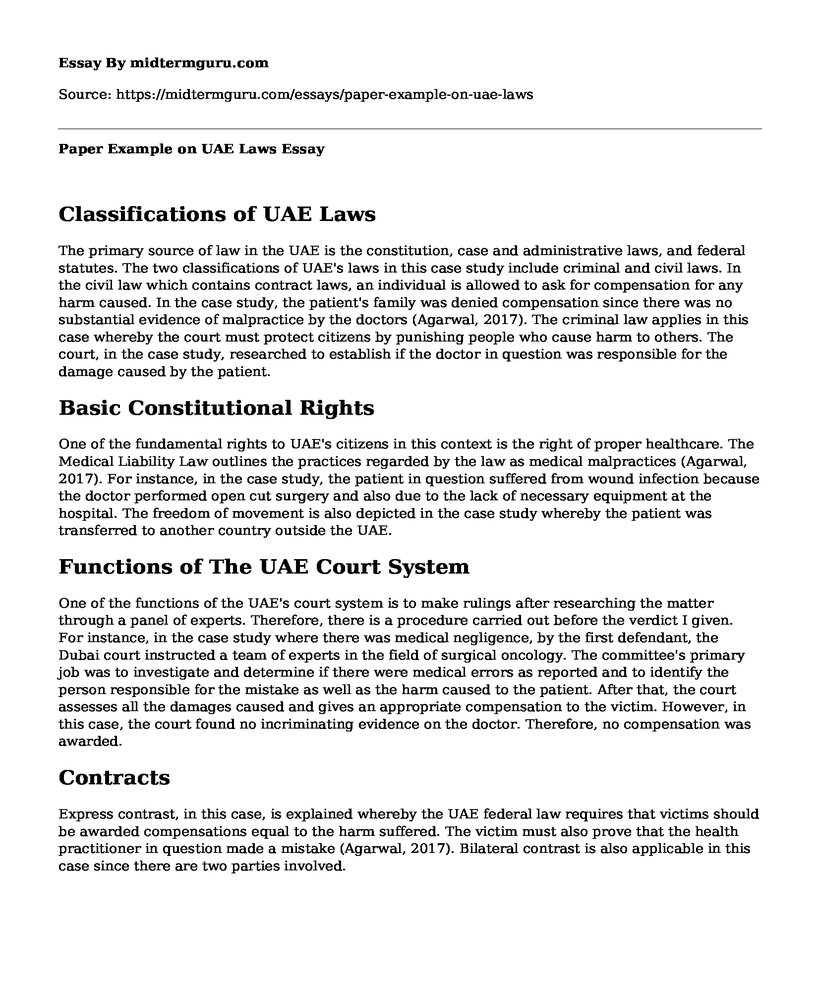Classifications of UAE Laws
The primary source of law in the UAE is the constitution, case and administrative laws, and federal statutes. The two classifications of UAE's laws in this case study include criminal and civil laws. In the civil law which contains contract laws, an individual is allowed to ask for compensation for any harm caused. In the case study, the patient's family was denied compensation since there was no substantial evidence of malpractice by the doctors (Agarwal, 2017). The criminal law applies in this case whereby the court must protect citizens by punishing people who cause harm to others. The court, in the case study, researched to establish if the doctor in question was responsible for the damage caused by the patient.
Basic Constitutional Rights
One of the fundamental rights to UAE's citizens in this context is the right of proper healthcare. The Medical Liability Law outlines the practices regarded by the law as medical malpractices (Agarwal, 2017). For instance, in the case study, the patient in question suffered from wound infection because the doctor performed open cut surgery and also due to the lack of necessary equipment at the hospital. The freedom of movement is also depicted in the case study whereby the patient was transferred to another country outside the UAE.
Functions of The UAE Court System
One of the functions of the UAE's court system is to make rulings after researching the matter through a panel of experts. Therefore, there is a procedure carried out before the verdict I given. For instance, in the case study where there was medical negligence, by the first defendant, the Dubai court instructed a team of experts in the field of surgical oncology. The committee's primary job was to investigate and determine if there were medical errors as reported and to identify the person responsible for the mistake as well as the harm caused to the patient. After that, the court assesses all the damages caused and gives an appropriate compensation to the victim. However, in this case, the court found no incriminating evidence on the doctor. Therefore, no compensation was awarded.
Contracts
Express contrast, in this case, is explained whereby the UAE federal law requires that victims should be awarded compensations equal to the harm suffered. The victim must also prove that the health practitioner in question made a mistake (Agarwal, 2017). Bilateral contrast is also applicable in this case since there are two parties involved.
Conclusion
In conclusion, the UAE has a constitution which outlines various rights and freedoms of its citizens. Regarding the case study, there is a Medical Liability Law which defines the circumstances in which compensation should be awarded to the patient. However, the court follows a specific procedure before making its ruling by first appointing a team of experts to investigate if medical negligence occurred and if the accused party is guilty.
References
Agarwal, R. (2017). Medical Liability Law in the UAE: A New Horizon. Ct. Uncourt, 4, 2.
Cite this page
Paper Example on UAE Laws. (2022, Oct 20). Retrieved from https://midtermguru.com/essays/paper-example-on-uae-laws
If you are the original author of this essay and no longer wish to have it published on the midtermguru.com website, please click below to request its removal:
- Security Plan for Wal-Mart Paper Sample
- Ethical Theories of Healthcare Ethics and Law - Essay Example
- Paper Example on Wireless Network Attacks
- Right To Water: Research Paper
- Rise in Corporate Crime: Corporate Espionage & Security Measures - Research Paper
- Criminal Justice: Detaining People and Changing Correctional Institutions - Essay Sample
- Criminal Justice Act 2003: Evidence of Bad Character - Essay Sample







